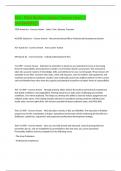DLC: Distributed Leader Course Level 1
(ANSWERED)
STEP Stands for - Correct Answer Select, Train, Educate, Promote
NCOPDS Stands for - Correct Answer Noncommissioned Officer Professional Development System
ACT stands for - Correct Answer Army Career Tracker
IDP Stands for - Correct Answer Individual Development Plan
S in STEP - Correct Answer Selection for promotion is based on your potential to serve at increasing
levels of responsibility, stemming from a leader's or promotion board's assessment. This assessment
takes into account mastery of knowledge, skills, and attributes for your current grade. Those chosen will
exemplify a true NCO: someone who leads, trains and educates, cares for Soldiers and equipment, and
maintains and enforces standards. Leaders must continually assess how Soldiers perform in their current
rank and identify those who show the capacity and potential to perform at higher levels of responsibility.
The T in STEP - Correct Answer Through training, NCOs achieve the tactical and technical competence
that builds confidence and adaptability. Training should occur daily under challenging and realistic
conditions, even when deployed. This helps you develop the ability to exercise mature judgement and
initiative under stress. This training includes directed or mandatory training common individual and
leader tasks, warrior battle drills, unit mission essential list-based collective tasks, and MOS skills.
The E in STEP - Correct Answer NCO education consists of DLC and NCOPDS. This education will better
prepare you for the complexities of today's operational environment while reinforcing the benefits of a
deliberate, continuous, sequential, and progressive professional development strategy.
The P in STEP - Correct Answer Once you are fully trained and educated, meet all prerequisites for
promotion pin-on, and are established as promotable to the next rank, you can be promoted.
Promotable Soldiers must be competient in the following areas:
- The Army Profession
- Professional competence
, - Team building
- Adaptability
- Lifelong learning
-Comprehensive fitness
NCOPDS - Correct Answer Provides NCOs with progressive leader, technical, and tactical training
relevant to the duties, responsibilities, and missions they will perform in operational units after
graduation.
Basic Leader Course (BLC) - Correct Answer BLC prepares the specialist/corporal for duties and
responsibilities as a sergeant. Using the Leadership Requirements Model (LRM) through a holistic
approach, learners will develop skills in written and oral communications, critical and creative thinking,
problem solving, leadership, counseling, drill and ceremonies, how to train Solders, character
development, troop leading procedures, and how to build effective teams. As a result, learners will be
able to train, lead, and conduct operations at the team level.
Advanced Leader Course (ALC) - Correct Answer Consists of 2 components, the technical and the leader
core competencies (LCC).
Army Career Tracker (ACT) - Correct Answer Provides a means to create an integrated approach that
synchronizes professional development across three domains (operational, institutional, and self-
development); provide individual assessment and feedback capabilities; and allow each Soldier or
Civilian to collectively view Army training, experiential learning, and education data from a single
interface that provides a common training picture as well as their lifelong learning strategy.
Saluting the Flag and the National Anthem - Correct Answer The US Flag must never be dipped by way
of a salute or compliment. The organizational color will be dipped in salute in a military ceremonies
while the national anthem of the US, "To the Colors," or a foreign national anthem is playing. It will also
be dipped when rendering honors to organizations and individuals during the conduct of military
ceremonies.
Cannon Salutes - Correct Answer Cannon salutes will be fired with a commissioned officer present.
Salutes will not be fired between retreat and reveille, on Sundays, or on national holidays (excluding
Memorial Day and Independence Day). However, international courtesy or other special occasions could
require an exception. Cannon salutes generally will be rendered only to officers and officials of four-star
or equivalent grade or higher.




